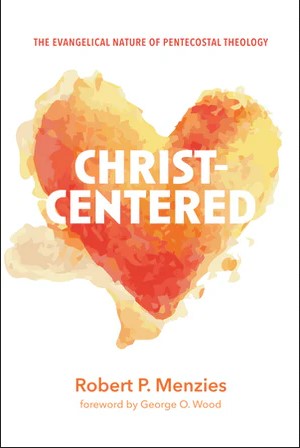Robert Menzies: Christ-Centered
 Robert P. Menzies, Christ-Centered: The Evangelical Nature of Pentecostal Theology (Eugene, Oregon: Cascade Books, 2020), 166 pages, ISBN 9781725267824.
Robert P. Menzies, Christ-Centered: The Evangelical Nature of Pentecostal Theology (Eugene, Oregon: Cascade Books, 2020), 166 pages, ISBN 9781725267824.
A few years ago, I was having lunch with a good friend, the editor-in-chief of a flagship evangelical magazine. I knew him well enough to raise a question: “Tell me something: Why do your articles regularly refer to ‘evangelicals and Pentecostals,’ as if they were two separate breeds? You wouldn’t print ‘evangelicals and Baptists’ or ‘evangelicals and Arminians.’ I’m a Pentecostal—and I wholeheartedly uphold the authority of Scripture, the divinity of Jesus Christ, the necessity of personal salvation, the call to spread the gospel … what else do I have to do to be considered a legitimate ‘evangelical’?”
He smiled as he granted that I had half a point. He made no commitment, however, to change his publication’s verbiage.
This notion—that a great gulf of different worldviews separates Evangelicals and Pentecostals—rests on a caricature of both movements.
Granted, he had no time for speaking in tongues, which began blossoming at the Azusa Street Mission just few years before Torrey headed west in 1912 to lead the nearby Bible Institute of Los Angeles (B.I.O.L.A.). The first chapter of Menzies’ book explains why. But Torrey consistently resisted all efforts to submerge Spirit baptism into something purely internal or transactional. Three years after Torrey’s death, when Moody Bible Institute wanted to alter a section of his correspondence course on the baptism with the Holy Spirit, Menzies reports that his daughter Edith was “horrified” and said absolutely not.
In subsequent chapters Menzies draws heavily on the witness of Luke’s writings to establish Pentecostalism’s bona fides as Evangelicals (the author capitalizes the term throughout his book). He affirms that in Luke-Acts, “we find the central and distinctive message of the Pentecostal movement…. For far too long Protestant theology has highlighted Paul’s important insights into the work of the Spirit, but largely ignored Luke’s contribution.” From Jesus’ promise that his Father would “give the Holy Spirit to those who ask him” (Lk. 11:13) to his final instruction to “stay in the city until you have been clothed with power from on high (Lk. 24:49) … to the abundant fulfillments throughout Acts over at least a 20-year span, Luke’s works are not to be sidelined. (Most Christians don’t realize that Luke actually wrote more of the New Testament—37,932 words in Greek—than did Paul, who gave us just 32,408).
Menzies draws heavily on the witness of Luke’s writings to establish Pentecostalism’s bona fides as Evangelicals.
Paul’s counsel in 1 Corinthians 12-14 (and elsewhere), however, is not ignored. Menzies spends a whole chapter on the Pauline perspective, unpacking the value and place of inspired speech in the gathered assembly. His treatments of what it means to “pray in the Spirit” and even “sing in the Spirit” are thorough and clarifying.
It’s hard to find any bone to pick with this book. Perhaps, with hindsight, the author’s chapter on “Signs and Wonders” might not have criticized some translations (particularly the NIV 1984) for their renderings of Luke 17:21 (“the kingdom of God is within you,” as if to imply that the kingdom is solely inside the believer, out of sight). He apparently did not notice the NIV 2011’s update, which says instead, “the kingdom of God is in your midst”—something widely visible in the praxis of the early church.
Pentecostals have a unique contribution to make to the larger Evangelical family; but, if we abandon our Evangelical values, we will lose our way and God will raise up others to make this contribution.
Meanwhile (to extrapolate from 1 Corinthians 14:39), let us “forbid not” to include tongues-speaking Pentecostals as legitimate participants in the Evangelical community of faith. The book’s conclusion says it well: “This notion—that a great gulf of different worldviews separates Evangelicals and Pentecostals—rests on a caricature of both movements…. Pentecostals have a unique contribution to make to the larger Evangelical family; but, if we abandon our Evangelical values, we will lose our way and God will raise up others to make this contribution.”
Reviewed by Dean Merrill
Publisher’s page: https://wipfandstock.com/9781725267824/christ-centered/
Category: Biblical Studies, Summer 2021


